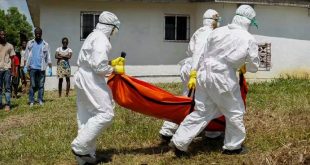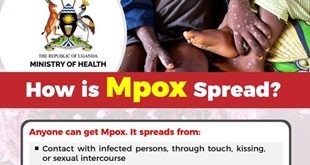
It’s a case of same health problems as the general population plus specific health-care needs
Kampala, Uganda | PATRICIA AKANKWATSA | Autistic people are often subject to stigma and discrimination, including unjust deprivation of health care, education, and opportunities to engage and participate in their communities.
While speaking at the World Autism Day on April 2, Monica Rukundo; the Executive Director Autism Care Uganda, said that autistic people needed to be included in education and employment opportunities and this can only be done through awareness.
“People with autism have the same health problems as the general population. However, they may, in addition, have specific health-care needs related to autism or other co-occurring conditions,” she said.
They may be more vulnerable to developing chronic noncommunicable conditions because of behavioural risk factors such as physical inactivity and poor dietary preferences and are at greater risk of violence, injury, and abuse.
Dr Anita Arinda, a psychiatrist based at Butabika National Referral Mental Hospital in Kampala, says that autism spectrum disorders (ASD) are a diverse group of conditions. They are characterised by some degree of difficulty with social interaction and communication.
Other characteristics are atypical patterns of activities and behaviours, such as difficulty with the transition from one activity to another, a focus on details and unusual reactions to sensations.
The abilities and needs of autistic people vary and can evolve. While some people with autism can live independently, others have severe disabilities and require life-long care and support.
Arinda says that autism often has an impact on education and employment opportunities. In addition, the demands on families to provide care and support can be significant. Societal attitudes and the level of support provided by local and national authorities are important factors determining the quality of life of people with autism.
Maureen Nakyanzi, a therapist at Autism Care Uganda, says that autistic people have higher rates of unmet healthcare needs compared with the general population. They are also more vulnerable during humanitarian emergencies. A common barrier is created by healthcare providers’ inadequate knowledge and understanding of autism.
“People with autism require accessible health services for general health-care needs like the rest of the population, including promotive and preventive services and treatment of acute and chronic illness,” she says.
Diagnosing autism
According to Dr Richard Idro, a paediatric neurologist in the Department of Paediatrics and child health at Makerere University College of Health Sciences, autism is a neural development disorder characterised by repetitive behaviour, mood alterations, impaired social interactions and difficulties in communication.
Children with autism have delayed speech, find trouble expressing their needs and emotions, tend to stay alone, do things alone and cannot look people in the eye. They also have rotative behaviour, follow routines, do things repetitively and love the semblance of most things and any change agitates them.
“If a child is diagnosed with autism, the area of the brain responsible for concentration attention, speech and memory is damaged,” he says.
One symptom of autism is speech delay and if they attempt to speak, the speech may not be contextual and often, it is a repeated statement copied from another person. Some children become nonverbal or their speech is faulty.
“A parent may also notice that such a child sits alone. Some parents worry that the child has a hearing problem but if there is a favourite TV programme or music that draws their attention, they will watch or listen to it,” Dr Idro says.
Repetitive behaviour such as playing with their hands, following specific routines, hyperactivity, inability to sit still, epilepsy and learning problems are the commonest symptoms.
“A child psychiatrist or paediatrician would be able to assess the autism spectrum because it ranges from mild to severe and while some children have a few symptoms, others have more. This disorder cannot be noticed when the child is born but after a year or two, a parent or guardian may be able to notice it,” he adds.
Available scientific evidence suggests that there are probably many factors that make a child more likely to have autism, including environmental and genetic factors.
Available epidemiological data conclude that there is no evidence of a causal association between measles, mumps and rubella vaccine, and autism.
There is also no evidence to suggest that any other childhood vaccine may increase the risk of autism. Evidence reviews of the potential association between the preservative thiomersal and aluminium adjuvants contained in inactivated vaccines and the risk of autism strongly concluded that vaccines do not increase the risk of autism.
According to the Uganda Bureau of Statistics figures, ASD prevalence is put at 70 out of 10,000 persons. Countrywide, about 388,000 suffer from autism and in terms of regional share, the Eastern region has the highest number of children at 113, 000 and the lowest number is in the northern region with 80,000 sufferers.
Caring for the autistic
Dr. Idro says that a broad range of interventions, from early childhood and across the life span, can optimise the development, health, well-being and quality of life of autistic people.
“It is important that, once autism has been diagnosed, children, adolescents and adults with autism and their careers are offered relevant information, services, referrals, and practical support, by their individual and evolving needs and preferences,”
“The healthcare needs of people with autism are complex and require a range of integrated services, that include health promotion, care and rehabilitation. Collaboration between the health sector and other sectors, particularly education, employment and social care, is important,”
Nakyanzi says that interventions for people with autism and other developmental disabilities need to be designed and delivered with the participation of people living with these conditions. Care needs to be accompanied by actions at community and societal levels for greater accessibility, inclusivity and support.
“So far, no policy provides for inclusive education for special needs in Uganda. The country is just developing a streamlined policy that will cater to all forms of special needs before it’s presented to parliament for debate and final passing into law but it’s unclear when this law will eventually be passed,” she says.
World Autism Day
According to World Health Organisation (WHO), Autism was brought to the attention of the Member States and the United Nations General Assembly in 2007. In January 2008, the General Assembly adopted resolution 62/139 which designated 2 April as World Autism Awareness Day.
The subsequent observation of that Day has substantially increased international awareness of autism spectrum disorders.
On 12 December 2012, the General Assembly unanimously adopted a resolution entitled “Addressing the socioeconomic needs of individuals, families and societies affected by autism spectrum disorders (ASD) developmental disorders (DD) and associated disabilities”.
It encourages the Member States inter alia to enhance access to appropriate support services and equal opportunities for inclusion and participation in society for persons with autism spectrum disorders, developmental disorders, and associated disabilities.
It recognises that to develop and implement feasible, effective and sustainable intervention programmes for addressing such disorders, an innovative, integrated approach would benefit from a focus inter alia on enhancing and increasing research expertise and service delivery.
It also calls upon States to ensure inclusive education systems and to enable the learning of life and social development skills.
In May 2012, childhood mental disorders, which include autism spectrum disorders and other developmental disorders, were considered by the Sixty-fifth World Health Assembly which adopted a resolution on the global burden of mental disorders and the need for a comprehensive, coordinated response from health and social sectors at the country level.
It urged Member States inter alia, according to national priorities and within their specific contexts, to develop and strengthen comprehensive policies and strategies that address the promotion of mental health, prevention of mental disorders, and early identification, care, support, treatment and recovery of persons with mental disorders.
It also requested the Director-General to develop a comprehensive mental health action plan, in consultation with the Member States. The Executive Board at its 132nd session, in January 2013, approved the process proposed by the Director-General for the finalization of that plan for submission to the Sixty-sixth World Health Assembly.
****
 The Independent Uganda: You get the Truth we Pay the Price
The Independent Uganda: You get the Truth we Pay the Price


